Immigration
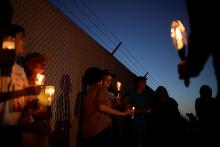
Before the finger pointing and blaming begins let me be clear: This is not a partisan issue. This is not a political issue. This is a moral issue. We have a moral responsibility to ensure that the conditions for every child are not just adequate but are as good as any parent would expect for their own children.
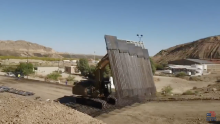
A private organization supported by some of President Donald Trump’s most ardent supporters announced Monday that it constructed a short section of border fence over the weekend.

Hunger strikes allow detained immigrants to regain their agency while simultaneously throwing themselves on the mercy of the very institution that has oppressed them.

I stared down at the bones. Whether covered under centuries of sand or exposed to sun, the body was claimed by the desert in life and afterlife. Even though it had been uncovered decades earlier, the dust of the desert never released it from its grip. Father Francisco Eusebio Kino died far from his Italian home. Migrants along the way had told me of the crypt of the Jesuit priest who had missionized the Sonoran Desert 300 years prior. He first entered this desert on a mission in 1687 and it swallowed him in 1711.
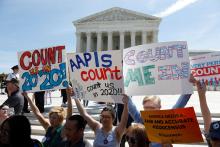
The court has a 5-4 conservative majority and has backed Trump in other high-profile cases. Conservative justices indicated a citizenship question would be eminently reasonable, noting that other countries use such questions and that the United States has done so in the past in one form or another.
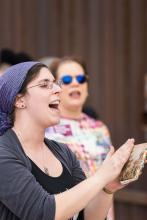
It was Wednesday, March 27th. I was one of 20 rabbis and cantors, assembled by T’ruah: The Rabbinic Call for Human Rights and the Hebrew Immigrant Aid Society (HIAS), to witness and report on the border. A few hours earlier, CBP Commissioner Kevin McAleenan (now ICE’s acting director) had held a press conference at the same spot.
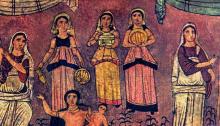
There have always been demagogues. Those who win power and popularity by arousing the prejudices of the people. Demagoguery was not invented by Donald Trump or Hitler. I’ll bet even Pharaoh in the book of Exodus didn’t invent the concept, but he perfected it. He never knew Joseph, the son of Jacob. He didn’t personally benefit from Joseph’s leadership and wisdom. Joseph, a Hebrew man brought to Egypt as a victim of human trafficking, but who with God’s favor rose to become the most powerful man in Egypt — he was the man whose interpretations of dreams saved everyone from famine.
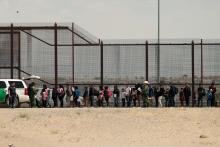
In June 2018, the Trump administration issued a “zero tolerance” policy in an effort to deter migrants, a majority from Central America, from entering the U.S. The policy resulted in the separation of nearly 2,800 immigrant children from their families at the U.S.-Mexico border in a little over a month.

It will come as no surprise when President Trump continues his anti-immigrant agenda, ignoring well-established U.S. asylum law and putting children and families in harm’s way even after Secretary Nielsen’s abrupt departure. We know that President Trump forced Secretary Nielsen to resign to find someone willing to enforce even more cruelty at the border. The question now is what unchecked harm he will unleash after the purge of the Department of Homeland Security is complete.

In my Mexican heaven, my grandfather's hands would be calloused from turning pages of poetry. He would be sitting at the dinner table, sipping coffee, and reading, looking up as I walked out the door to tell me “que dios te bendiga mijo.” He wouldn’t sing hymns or shout hallelujah, but every evening at the same time he’d sing the song “Gema” to my grandmother.
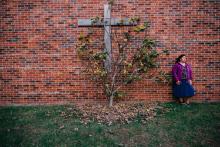
In May 2017, Juana Luz Tobar Ortega took sanctuary at St. Barnabas Episcopal Church in Greensboro, N.C. Originally from Guatemala, she had received a deportation sentence that would have separated her from her husband, four children, and two grandchildren, after living and working in the United States for over 20 years. Juana’s story, which is one among many harrowing stories of families harmed by aggressive immigration policies under the Trump administration, is now the subject of a documentary film.

U.S. Homeland Security Secretary Kirstjen Nielsen, who oversaw President Donald Trump's bitterly contested immigration policies during her tumultuous 16-month tenure, resigned on Sunday amid a surge in the number of migrants at the border with Mexico.
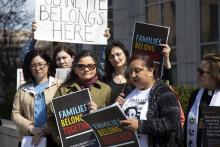
Jeanette Vizguerra, a mother and prominent activist under threat of deportation, on Thursday called to thank faith leaders and supporters who petitioned at the U.S. Immigration and Customs Enforcement (ICE) headquarters in Washington, D.C., for a stay of removal and visa approval for Vizguerra.
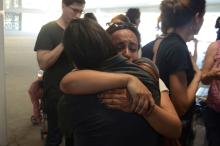
Saturday evening a story broke on The Washington Post that 29 parents were at the U.S. border with legal advocates, reapplying for asylum and attempting to get back the children that had been taken from them into U.S. custody. At the same time, Glennon Doyle and her nonprofit group Together Rising sent out an email giving more background on how those 29 parents were found and brought together to the border. Two of Together Rising’s board members, Liz Book and Glennon’s sister Amanda Doyle, were there with the families and sending live video updates. Initially, they were told that there was no capacity to process the asylum seekers — but around 8 p.m. Saturday they began allowing all 29 parents and their families to enter.

President Donald Trump vowed on Thursday to declare a national emergency in an attempt to fund his U.S.-Mexico border wall without congressional approval, a step likely to plunge him into a court battle with Congress over constitutional powers.
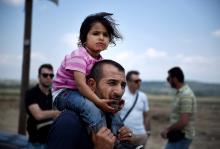
THE DEUTERONOMY PASSAGE that ushers in our Lenten pilgrimage underscores the sacred mandate to embrace foreign immigrants with generous hospitality. Instructions for the liturgy for harvest thanksgiving conclude: “Then you, together with the Levites and the aliens who reside among you, shall celebrate with all the bounty that the Lord your God has given to you” (26:11). Worshippers are required to certify in the assembly before God that they have participated in providing what the vulnerable in society need, not least refugees. “I have removed the sacred portion from the house, and I have given it to the Levites, the resident aliens, the orphans, and the widows” (verse 13). Paul speaks of the Spirit of freedom removing the veil that blinds us to the core meaning of the sacred texts. In the current climate of xenophobia and incitements to make refugees into scapegoats, Christians are called to rip down the veil that prevents people from hearing this Word.
As for the intimate personal dimension or Lenten conversion, this might be the time to realize more profoundly that much of our own sinfulness and confusion arises from the harshness with which each one of us rejects and starves elements of our own inner “community of selves,” those parts of our humanity we try to disclaim and repress. It is the Spirit’s inner work of integration that teaches us to embrace those “selves of the self” we find ugly, pathetic, needy, or too passionate and creative for comfort. Our outer practice and inner practice of hospitality and inclusion belong together.
[ March 3 ]
Radiation Exposure
Exodus 34:29-35; Psalm 99; 2 Corinthians 3:12-4:2; Luke 9:28-43a
“And all of us with unveiled faces, seeing the glory of the Lord as though reflected in a mirror, are being transformed into the same image from one degree of glory to another; for this comes from the Lord, the Spirit” (2 Corinthians 3:18). The Epiphany season’s celebration of the glory of God revealed in the face of Jesus Christ concludes with the theme of transfiguration (metamorphosis is the Greek word). The appointed scriptures are the key for understanding the dynamic of Lent as we prepare to enter that season of renewal. Our transformation can never be accomplished by conforming to external imperatives, nor by the embracing of “values,” however lofty and demanding. Our moral transformation works through contemplation of the open heart of God exposed in the self-giving life of Christ, a kind of contemplation as “radiation therapy” in which our inner falsity is irradiated by the beams of God’s unbounded, costly love, lived out by Jesus through his “exodus” (Luke 9:31) into the cross.
Prayer is the perpetual treatment in which, little by little, we deepen our participation in the divine life of vulnerability, transparency, and truthfulness. “We have renounced the shameful things that one hides; we refuse to practice cunning or to falsify God’s word” (2 Corinthians 4:2), but this is not the result of our own program of moral effort; it rises from “the Lord, the Spirit” doing the work of inner liberation in us while we are steadfastly fixing our gaze on Jesus.
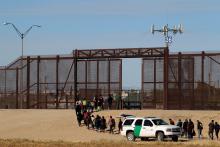
The U.S. government will return the first group of migrants seeking asylum in the United States to the Mexican border city of Tijuana on Friday, U.S. and Mexican officials said, marking the start of a major policy shift by the Trump administration.
The policy, dubbed the Migrant Protection Protocols (MPP) and first announced on Dec. 20, will return migrants, including non-Mexicans, who cross the U.S. southern border back to wait in Mexico while their asylum requests are processed in U.S. immigration courts.

Pope Francis wasted no time wading in on the standoff over funding for a U.S.-Mexico border wall on Wednesday as he started his trip to Panama, saying on the plane from Rome that hostility to immigrants was driven by irrational fear.
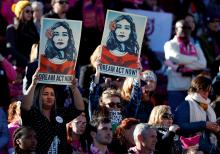
The U.S. Supreme Court temporarily closed the door on President Donald Trump's effort to end protections for hundreds of thousands of undocumented immigrants with the justices again silent on Tuesday on three related appeals.
With the lower court’s ruling against the administration and the high court not yet taking action, the Deferred Action for Childhood Arrivals (DACA) program remains in place for now, essentially maintaining the status quo for current DACA recipients. DACA protects about 700,000 immigrants, often called "Dreamers" based on the name of the Dream Act legislation that failed to pass Congress, from deportation and provides them work permits, though not a path to citizenship.

Leaders want to spend billions, not to help people living in desperation, but on the wall. We must ask ourselves, and our elected leaders, what are the true costs when we allow ourselves to be consumed by fear? Are we willing to put the wall ahead of the God of mercy who came to us as a child fleeing violence? Thousands of God’s children remain in the squalor of tent cities in Tijuana and detention centers, unwelcome in Mexico and the United States. Some are returning to violence at home having lost any hope for asylum they are legally entitled to request.